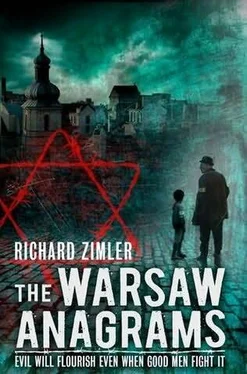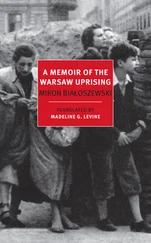‘Do you really know how to use it?’
‘Erik, it doesn’t require a doctorate from the Sorbonne,’ he replied, snorting. ‘It takes a five-round clip – couldn’t be easier. Besides, you learn a lot about a pistol when you take it apart and give it a cleaning. It’s a lot simpler to put back together than a Swiss cuckoo clock, I can tell you that!’ He took my arm. ‘I thought it was a good touch my kissing the pistol – and calling it Marlene. Nobody would think a Jew would do that.’
As we walked down Spacerowa Street, Izzy and I debated whether the jeweller would keep up his end of our bargain. We could easily believe that his greed would win out over his anger – and whatever suspicions he had about us – but we also knew he might simply pick up the phone and call the police. So we decided to keep watch on his shop from a fabric store down the street. We chose that particular locale because Izzy was eager to buy a few yards of tweed for a warm pair of winter trousers.
If no police showed up, we’d go back to get our money at 2.30.
I wanted to wash the burn on my arm with cold water, and the shop owner was kind enough to let me use the sink in his loo, where I inspected the damage. Mrs Sawicki was right – there’d be a scar. My skin was throbbing. Splashing water on it did little good.
Back at my post by the front door, I discovered that the coast was still clear. As the minutes clicked past, I began to believe that I’d been needlessly apprehensive. Hope that one has chanced upon the road back to the way things used to be is apparently a strong desire in those who’ve been locked outside their previous lives.
Izzy was looking at different herringbone patterns on the counter, delighted with his range of options. The mystery of Anna’s connection to Adam was still nagging at me, and after a couple of minutes I went to him.
‘Imagine you’re fourteen years old,’ I whispered. ‘You’re in trouble, and you need your boyfriend’s help, but he’s in Switzerland and his mother has just treated you like an insect. You can’t talk to your parents, because you’re a prisoner in their home. So where do you go?’
He closed his eyes to consider my question. ‘I’m not sure, let me think about it,’ he finally replied. A couple of minutes later, after he’d picked out the fabric he wanted, he called me over and said, ‘Erik, Anna would have gone back to the one person who’d treated her well – Mikael Tengmann.’
‘That’s what I figured,’ I replied, ‘except that Mikael’s nurse told me she was never at his office. But let’s assume he did see her, and that she wanted to talk to him again, where would she have gone to see him?’
‘At his home.’
‘No, I don’t think so – his office is in his home.’
A half a minute or so later, when I peeked out the door, a Gestapo officer was standing outside Jawicki’s, about fifty paces away. He was putting on black leather gloves. Parked next to him was a black Mercedes.
I realized we’d been fools not to simply leave this part of town and offer Hannah’s ring to another jeweller. We were colossal amateurs at this life of subterfuge.
‘Is there a back door that leads to some other street?’ I asked the owner, who was ringing up Izzy’s purchase.
He frowned at me, and I could see he thought that we were up to no good.
Grinning in what I hoped was a charming way, I told him I’d spotted someone I owed money to walking down the street; a stupid lie, but what could I say?
He told me there was only the front door, so I made Izzy pay quickly and then steered him there. ‘The Gestapo are on to us,’ I whispered. ‘When we get outside, don’t look towards Jawicki’s. Just walk slowly to the right.’
Stepping on to the sidewalk, we heard no screams or whistles, but after twenty or so paces, when I looked back to see what was happening, the Gestapo officer had his gun drawn and was staring at me; the jeweller must have told him what we looked like. My turning round had only confirmed that we were the suspects he was after.
I must have groaned or given away my panic in some other way; Izzy looked back.
‘We’re fucked!’ he whispered.
‘We’ve got to run!’ I told him.
We took off west on Szucha Street and made it to Rakowiecka before Izzy’s arthritis made him double over. Panting, he pushed me off. ‘Get going!’ he ordered. ‘I’ll shoot the Nazi when he gets close.’
I felt as if everything I’d ever lived for were turning slowly around this one moment, but I wasn’t about to let Izzy sacrifice himself for me.
‘I’m too tired to run,’ I replied. ‘You’re stuck with me.’
By now, the Gestapo officer had turned the corner – no more than sixty yards from us. He was in good shape, and young. A sense of doom pounded in my chest.
‘Erik!’
Izzy had stumbled forward into the doorway of an apartment house and was waving me towards him.
I joined him in the dark hallway. My throat felt as if it had been scraped with a rasp. The burn on my arm was aching.
‘You think he saw us come in here?’ Izzy asked in a whisper.
‘Probably. And anyway, people on the street noticed and will denounce us. Come on,’ I said, grabbing his arm, ‘let’s get out of here!’
We pushed through the rear door into the courtyard, which had been dug up to make a garden, though winter had starved it to a barren tangle of skeletal vines and brambles. A strongly built, middle-aged woman in a dark headscarf, plaid overcoat and frumpy woollen slippers was bent over in the far corner, pulling out metal stakes around which clung the withered tendrils of dead sweet peas. Behind her, the remains of tomato plants tortured by the wind and cold crumpled against a rusted trellis. The woman’s torn gloves dangled from the rim of her lopsided wooden barrow, which looked like a relic from the Iron Age.
Today, in my mind, I see her as though she were symbolic of all the women who bear misery with lips sealed to silence.
She looked up at Izzy and me, staring at my armband.
‘We mean no harm,’ I assured her in Polish.
She picked up her spade, but not in a threatening way. She stood with it, her posture rigid, as though she were posing for a portrait. I threw down my armband. ‘We’re not Nazis,’ I told her, opening my hands. ‘We’re in the Resistance and we’re in trouble.’
The woman’s face showed the indifference of stone. After leaning her spade against her barrow, she bent over, pulled out another stake and tossed it with a harsh clang into the pile she’d made.
Izzy and I were still gasping for breath. To be sixty-seven years old in the Polish winter is to know the limits of the body.
‘Thank God we didn’t go far away from Jawicki’s,’ Izzy told me.
‘What do you mean?’ I asked.
‘If we’d come back only when we were supposed to, the Mercedes would have been hidden around the corner. We’d have never known that that son-of-a-bitch called the Gestapo until it was too late.’
A brick wall, five feet high, separated us from a second apartment house at the back. A cane-work chair had been put there – for kids to hoist themselves over the wall and take a winter shortcut to the next street, most likely.
‘Come on!’ I told Izzy, pointing to the chair. ‘Let’s try our luck.’
We’d just started forward when the door behind us opened. Out stepped the Gestapo officer who’d been chasing us. He was holding a pistol.
‘Don’t move!’ our assailant ordered in German.
He was no more than twenty years old, with copper-coloured hair shining under his cap and long blond eyelashes. He’s just a rabbit of a boy, and if I don’t lose my nerve …
Читать дальше












